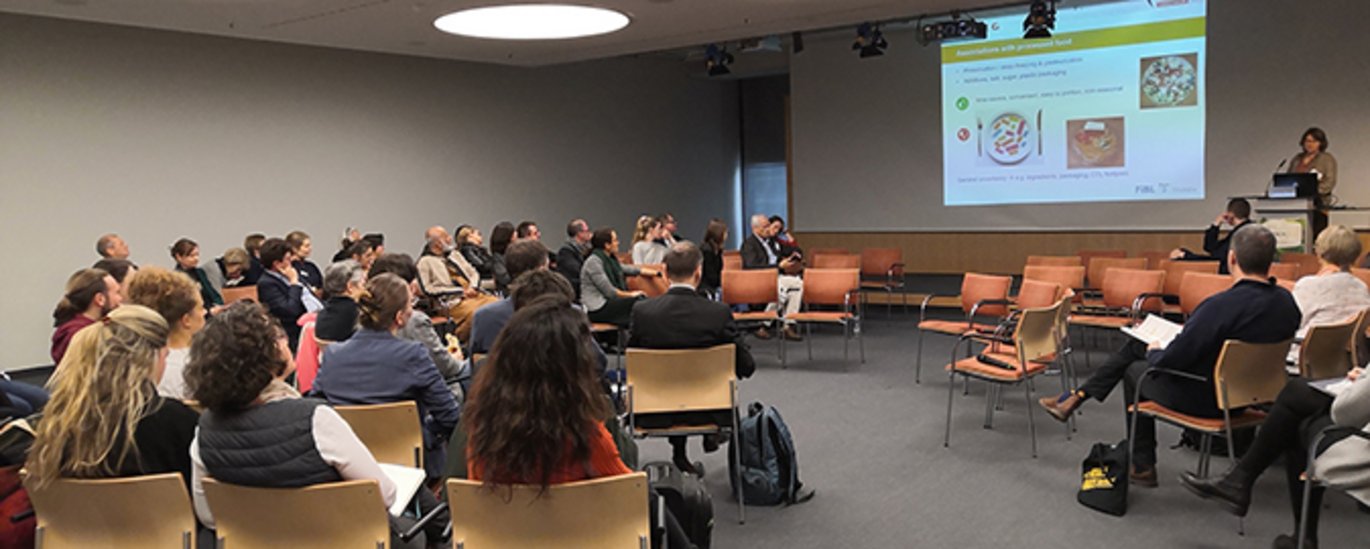Careful, Gentle, Minimal: What are the principles of organic processing?
A joint workshop was held at Biofach 2020 about the projects ProOrg and SusOrgPlus, which both deal with research topics around careful and organic processing. Furthermore, the workshop gave a practical example from a Latvian company.

During Biofach 2020 scientists, practitioners and interested participants met for a congress session about organic processing. The session offered scientific findings from the CORE Organic Cofund projects ProOrg and SusOrgPlus, gave a practical example about processing of starches and proteins and ended in a lively discussion with participants in the room.
Regula Bickel from FibL first introduced the project ProOrg and the current draft of an Assessment Framework to use when making a choice for a processing method. First the context has to be established and criteria have to be defined. For example: Does the company only want to look at the processing itself or is packaging also part of the assessment? And does it only want to compare the energy use of the method or are aspects of nutritional or sensory quality also relevant? In the last step the overall evaluation takes place, including a weighting system and a naturalness check. In the end a result is given which offers the processor to make a choice.
Katrin Zander from Thünen Institut (also part of ProOrg) afterwards presented first results of focus group discussions and online surveys with consumers. These showed clearly, that organic processing technologies are not part of consumers’ understanding of the „organic concept“. They associate organic with ingredients and transparent and sustainable value chains. Also, consumers’ preferences do vary highly and they do not seem to be very informed about different processing methods. The research showed that consumers’ preferences can change though, when they are provided with adequate information.
Barbara Sturm from Universität Kassel presented the SusOrgPlus project focussing on intelligent food processing and natural additives and colourants. Drying is a technology with room for optimisation and increased intelligence in operating equipment. For instance, combining technologies and use of feedback from product characteristics leads to more efficiency in terms of energy and costs, sustainability and to better product quality. As an example, carotenoids retention after drying of carrot at different temperatures with and without tempering at a certain moisture content are presented, showing better retention with tempering. The process and product knowledge, combined with the developments in (data) computer technologies and sensor technologies allows for Quality by Design, integrating product performance, product and process design and process performance. The SusOrgPlus consortium demonstrated this in a climate neutral drying unit.
Last but not least Janis Garancs from Aloja Starkelsen Ltd gave an interesting insight how the company decided to process their starches and proteins towards functional organic ingredients. The nature of Finland, Sweden and Latvia surrounding locations of the Aloja Starkelsen company combined with the heavy burden of the current food production on the planet’s limited resources are clear motivators for Janis and his colleagues to work on organic starches and proteins. Key for starches and proteins are good functional properties. Organic food processing faces several challenges, such as availability and quality of raw materials and ingredients, meeting consumer expectations on “organic“, including level of processing of ingredients. Aloja Starkelsen ltd offers several functional organic ingredients with good functionalities: starches from potatoes and proteins from brown peas and fava beans, all products are locally sourced.
Relevant links
www.proorgproject.com/, project coordination Flavio Paoletti, flavio.paoletti@crea.gov.it
www.susorgplus.eu/, project coordination Barbara Sturm, babara.sturm@uni-kassel.de
www.organicpotatostarch.com, www.organicprotein.eu, Janis Garancs, janis.garancs@alojas.eu
Authors info
Johanna Stumpner, AöL e.V., johanna.stumpner@aoel.org www.aoel.org
Martijntje Vollebregt, Wageningen Food & Biobased Research, martijntje.vollebregt@wur.nl, www.wageningenur.nl/fbr
Editor: Karin Ullven / Design: Christine Dilling
